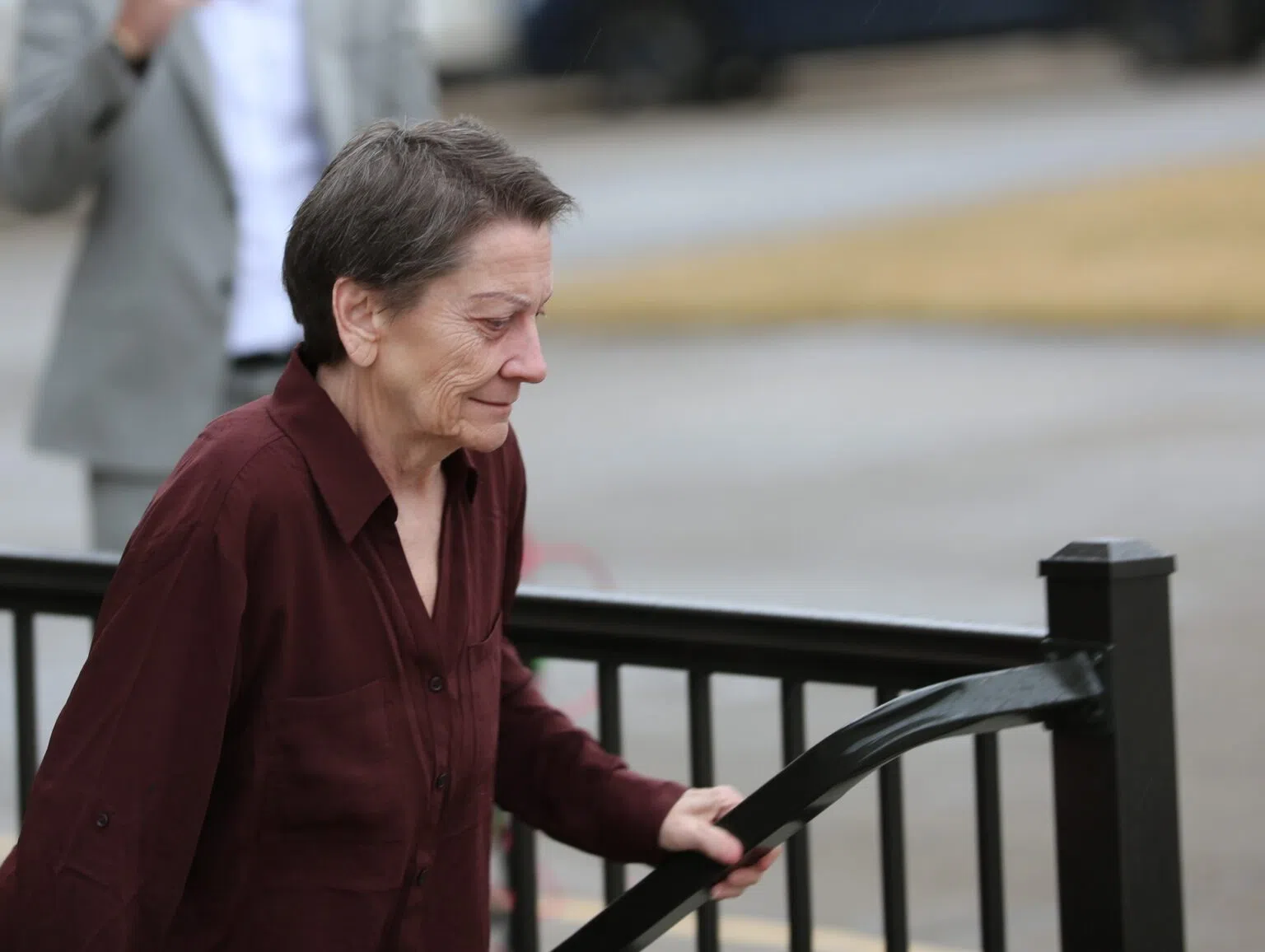
Lonna Carroll walks from the courtroom to a law enforcement vehicle after day one of her trial on April 1, 2025, at the Hughes County Courthouse in Pierre. (Joshua Haiar/South Dakota Searchlight)
By: Joshua Haiar
PIERRE, S.D. (South Dakota Searchlight) — Prosecutors played a recording Wednesday of a defendant allegedly confessing to the theft of $1.8 million from the state of South Dakota.
“I stole some money,” Lonna Carroll said while audibly crying in the recording.
Meanwhile, her defense attorney continued to say the state was negligent in its oversight and the case is too old to prosecute.
Wednesday was the second day of a trial expected to last three days at the Hughes County Courthouse. The state continued to present its case, after Tuesday’s opening statements and jury selection.
Carroll, a 68-year-old retiree, is charged with two felony counts of grand theft for crimes she allegedly committed from 2010 to 2023 while working as an administrative assistant for the Division of Child Protection Services in the state Department of Social Services. She faces up to 25 years in prison and a $50,000 fine for the first count, and 15 years in prison and a $30,000 fine for the second count.
Once a child is placed in the state’s care, Child Protection Services employees can make financial requests on the child’s behalf for items such as school supplies, clothing or a bed. The funds are deposited into a bank account for the child.
The prosecution alleges Carroll made requests for children that were no longer in the state’s care, approved the requests, deposited checks into accounts for the children at American Bank and Trust in Pierre, and later withdrew the deposited amounts in cash. Carroll allegedly did that 215 times, stealing a total of $1,777,665.73 over the course of 13 years.
The audio recording played for jurors included state Division of Criminal Investigation agent Charles Swanson walking Carroll through some evidence illustrating her involvement in the case.
She verbally admitted to depositing checks at American Bank and Trust and withdrawing the funds in cash, and answered yes when asked if the situation spiraled out of control.
The case is part of a rash of criminal allegations against state employees that state Attorney General Marty Jackley has filed since last year, leading not only to criminal prosecutions but also to a series of administrative and legislative reforms adopted in response.
Evidence shows spending on clothing, big cash deposits
Division of Criminal Investigation agent Matt Glenn led the investigation of Carroll after Department of Social Services staff contacted him on Feb. 26, 2024. A department employee had noticed discrepancies between spreadsheets and the balances in accounts that were managed by Carroll, who by that time had retired and moved to Algona, Iowa.
During Glenn’s testimony, the prosecution presented evidence that Carroll had been spending thousands on clothing. The evidence included photos of storage unit 56 at Capital Storage in Pierre. Carroll’s Wells Fargo bank statements showed she had been paying for the unit.
The unit was “full of totes and garbage bags full of clothes and other personal items,” Glenn said, including boxes of receipts.
Those receipts showed thousands of dollars spent on clothing, mostly in cash. One receipt showed $1,000 in cash spent at Al’s Oasis in Oacoma on clothing.
“It was clear she was living outside her means,” Glenn said.
Eric Grover, who identified as a coworker and friend of Carroll’s, said during his testimony that a local boutique knew her “and they would give her a call when they would get new shipments in.”
Carroll’s court-appointed attorney Timothy Whalen asked Glenn if the statute of limitations — a time limit on the prosecution of crimes — was considered in his investigation. Glenn replied that “the clock starts” when the crime is first reported.
Whalen has frequently objected to the admittance of evidence during the trial, arguing unsuccessfully that the charges were brought after the statute of limitations expired.
April Pontrelli works in the Attorney General’s Office as an intelligence analyst looking into white collar crimes, typically fraud. She conducted an analysis of Carroll’s personal Wells Fargo bank account, which showed cash deposits from 2010 to 2023 totaling $682,900.30.
The cash depositing peaked in 2016 when she deposited $79,815.13 — more than three times her annual take-home pay. The analysis showed she spent $48,000 on retail goods that year.
The analysis also showed she was leasing three vehicles by 2020 and had multiple apartments.
Defense questions state oversight
The Department of Social Services was audited while Carroll worked there. The department has an annual budget of $1.8 billion and more than 1,500 full-time positions.
Kelly Mikkelsen with the state Department of Legislative Audit testified that sample batches are used to audit state departments. He said those samples did not necessarily include accounts Carroll allegedly stole from.
Exhibits showed during his testimony that Carroll made and approved initial requests as low as $1,500 that eventually reached over $27,000. She would then deposit those sums as separate checks into accounts, and withdraw the money soon after.
Legislative Audit’s investigation indicated Carroll’s involvement in the theft of $591,305.20 from 2019 to 2022 alone. Those years were separated out because the transactions included the entire paper trail — from Carroll making and approving requests, to bank statements, slips and receipts for the cash she withdrew.
“Something that should have raised an eyebrow with somebody, wouldn’t you agree?” Whalen said.
He asked Mikkelsen why internal controls to catch such behavior were not in place.
“I think those were circumvented by Lonna Carroll,” Mikkelsen said. “There’s always another angle. There’s always a way to circumvent them.”
The prosecution is expected to rest its case Thursday, after which the defense will have a chance to present its case.




Comments